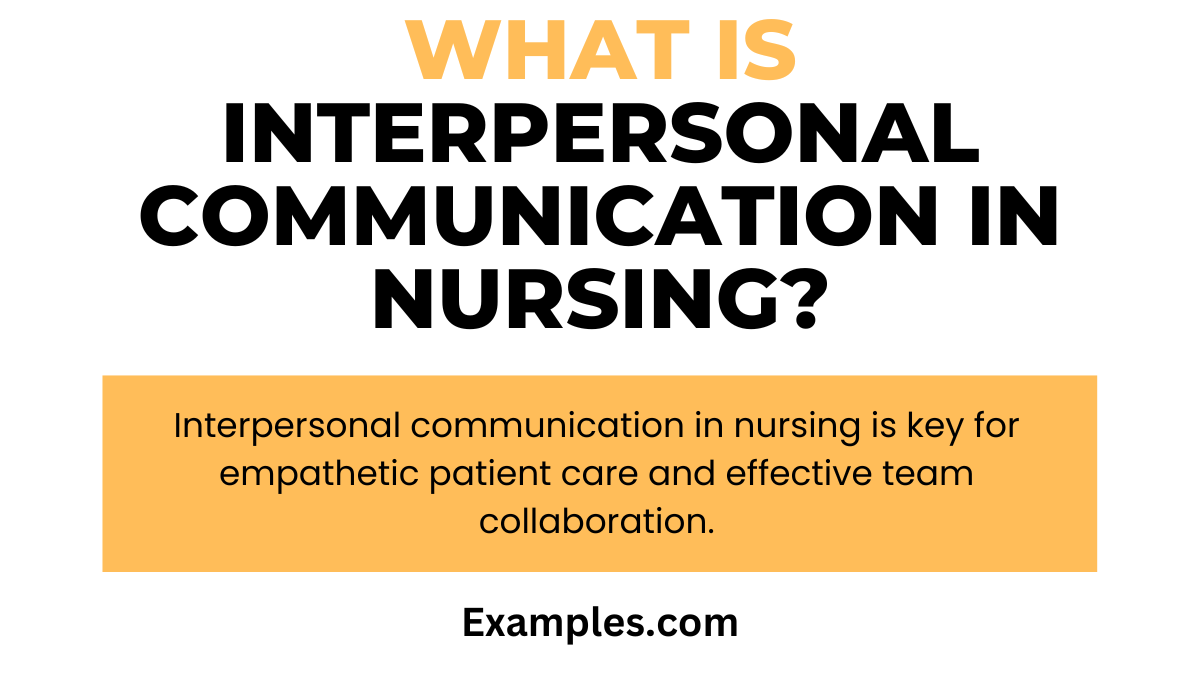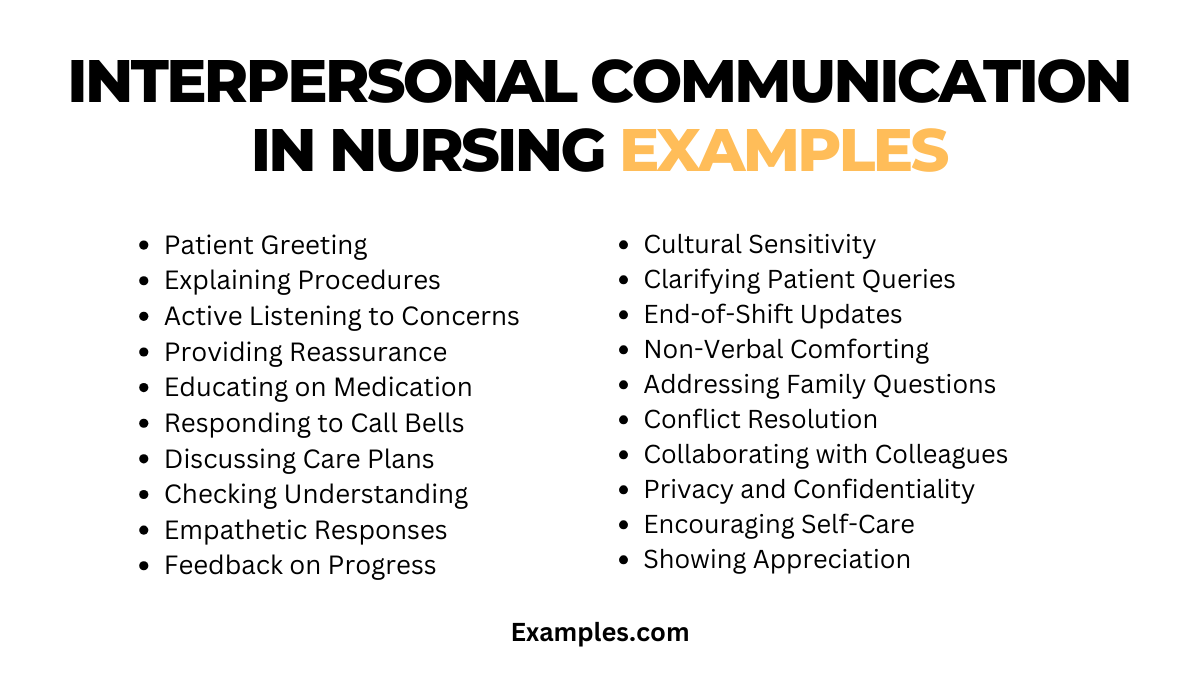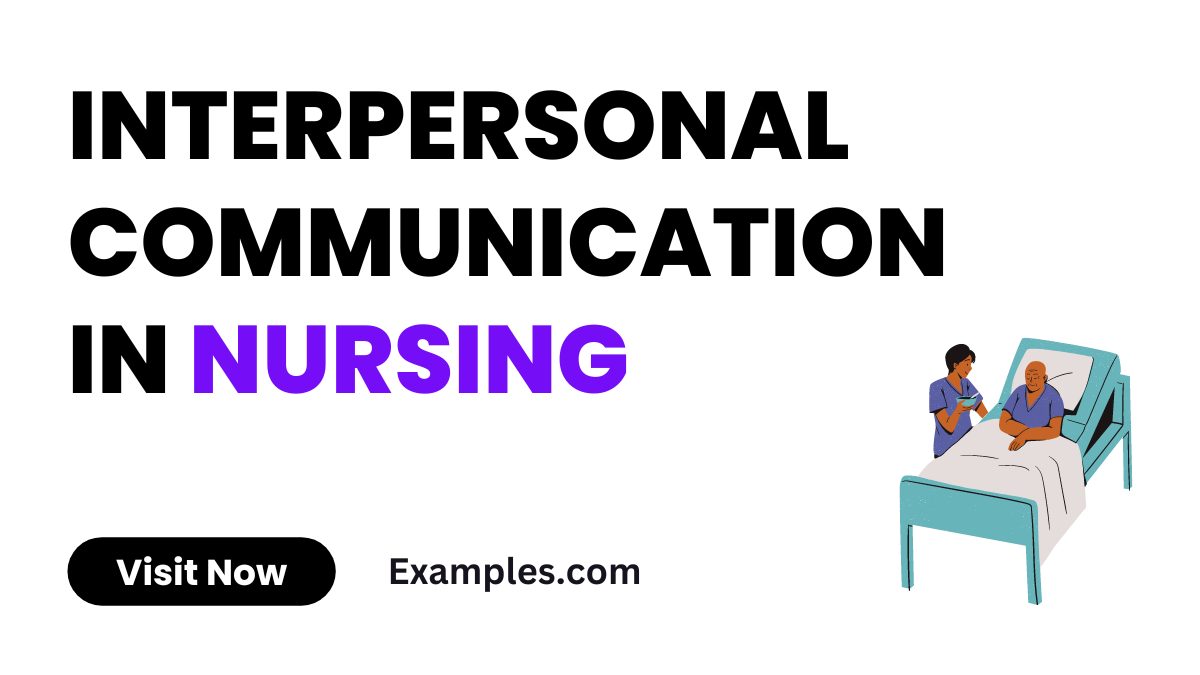19+ Interpersonal Communication in Nursing Examples
Interpersonal communication in nursing is a cornerstone skill, particularly in oral communication. It’s about more than conveying medical information; it involves empathetic interaction, active listening, and building trust with patients. Effective communication in nursing ensures accurate information exchange, fosters patient comfort, and aids in the delivery of compassionate care. Nurses who master these skills can improve patient experiences, ease anxieties, and contribute significantly to positive health outcomes.
What is Interpersonal Communication in Nursing?

Interpersonal communication in nursing refers to the way nurses interact with patients, colleagues, and other healthcare professionals. It encompasses both verbal and non-verbal communication skills. This includes how nurses convey medical information, listen to patient concerns, and offer emotional support. Effective interpersonal communication is crucial in nursing as it directly impacts patient care and treatment outcomes. It’s not just about what is said, but also how it is said and understood, making it a fundamental skill in the nursing profession.
20 Examples of Interpersonal Communication in Nursing

Interpersonal communication in nursing is essential for delivering patient-centered care, requiring skills like empathy, clarity, and active listening. It’s not just about medical information; it’s about understanding patient concerns, providing emotional support, and building trust. Effective communication fosters a positive healthcare environment, enhances patient safety, and improves overall care quality.
- Patient Greeting: Greeting patients warmly, such as saying “Good morning, Mrs. Jones! How are you feeling today?” sets a positive tone.
- Explaining Procedures: Clearly explaining procedures, like informing about starting an IV, reduces patient anxiety.
- Active Listening to Concerns: Showing empathy and understanding by addressing worries about surgeries or treatments.
- Providing Reassurance: Offering reassurance to patients can alleviate fears and anxiety.
- Educating on Medication: Educating patients about their medications helps in understanding and compliance.
- Responding to Call Bells: Quickly responding to call bells shows attentiveness and care.
- Discussing Care Plans: Involving patients in discussions about their care plans ensures they are informed and engaged.
- Checking Understanding: Asking patients if they have any questions ensures they understand their care.
- Empathetic Responses: Validating patient feelings, like acknowledging anxiety, shows empathy and support.
- Feedback on Progress: Providing positive feedback on a patient’s recovery can be motivating.
- Cultural Sensitivity: Addressing cultural preferences in diet or care respects individual needs.
- Clarifying Patient Queries: Ensuring patients’ questions are answered clearly avoids confusion.
- End-of-Shift Updates: Informing patients about shift changes and care continuity is reassuring.
- Non-Verbal Comforting: Using non-verbal cues like a gentle pat can offer comfort.
- Addressing Family Questions: Involving and informing family members provides additional support.
- Conflict Resolution: Resolving any concerns or conflicts enhances patient satisfaction.
- Collaborating with Colleagues: Discussing patient care with the healthcare team ensures comprehensive treatment.
- Privacy and Confidentiality: Discussing sensitive topics privately respects patient privacy.
- Encouraging Self-Care: Encouraging patients in self-care activities aids in their recovery.
- Showing Appreciation: Expressing gratitude for patient cooperation fosters a positive relationship.
Interpersonal Communication Skills in Nursing
In the nursing profession, interpersonal communication skills are fundamental to providing effective patient care. These skills enhance interactions with patients, colleagues, and other healthcare professionals.
- Active Listening: Vital for understanding patients’ needs and concerns, enabling nurses to provide appropriate care.
- Empathy: Demonstrating genuine care and understanding towards patients’ situations and emotions.
- Clarity in Communication: Conveying information in a clear, concise manner, crucial for patient understanding and treatment adherence.
- Patient Education: Effectively educating patients about their health, treatments, and procedures.
- Emotional Intelligence: Managing personal emotions and recognizing those of patients and colleagues.
- Cultural Competence: Understanding and respecting diverse cultural backgrounds and communication styles.
- Non-Verbal Communication: Using body language and facial expressions to convey empathy and understanding.
- Professionalism: Maintaining a professional demeanor in all forms of communication.
- Conflict Resolution: Addressing and resolving misunderstandings or disputes effectively.
- Feedback Skills: Giving and receiving constructive feedback for continuous improvement.
Elements of Interpersonal Communication in Nursing
Interpersonal communication in nursing encompasses several key elements, essential for effective patient care and teamwork.
- Verbal Communication: Using spoken words to exchange information with patients and team members.
- Non-Verbal Communication: Body language, eye contact, and facial expressions that supplement verbal communication.
- Listening: Active and empathetic listening to understand patients’ needs and concerns.
- Written Communication: Documenting patient information accurately and communicating effectively through written means.
- Feedback Mechanisms: Providing and receiving feedback to and from patients and colleagues.
- Cultural Sensitivity: Acknowledging and respecting different cultural norms and values in communication.
- Emotional Support: Offering comfort and reassurance to patients and their families.
- Patient Advocacy: Communicating patients’ needs and preferences to other healthcare professionals.
- Ethical Communication: Upholding confidentiality and honesty in all interactions.
- Interprofessional Collaboration: Effectively communicating with other healthcare team members for coordinated care.
Why is Interpersonal Communication Important in Nursing?
In the field of nursing, interpersonal communication is not just important; it’s a cornerstone of effective patient care. This form of communication is essential for several reasons:
- Enhances Patient Care: Effective communication allows nurses to understand patient needs, leading to better care and treatment.
- Builds Trust with Patients: Trust is fundamental in nursing, and good communication skills help establish and maintain this trust.
- Improves Patient Outcomes: Clear communication can lead to better patient outcomes, as it ensures that patients understand their treatment plans and are more likely to adhere to them.
- Facilitates Team Collaboration: Nursing often involves working in teams, and effective interpersonal communication ensures smooth collaboration and coordination among healthcare professionals.
- Manages Patient Expectations: Good communication skills help nurses manage patient expectations about their health and treatments.
- Supports Emotional Needs: Nurses often provide emotional support to patients and their families, which requires strong communication skills.
- Enhances Professional Development: Effective communication is key to professional growth and learning within the nursing field.
- Ensures Patient Safety: Clear communication is essential for patient safety, reducing the risk of errors in healthcare settings.
- Promotes Cultural Competence: Understanding and adapting to diverse cultural backgrounds in communication is vital in nursing due to the multicultural patient base.
How does Interpersonal Communication Play a Role in Nursing?
The role of interpersonal communication in nursing is multifaceted and critical to the profession’s success:
- Patient Assessment: Communication skills are necessary for accurately assessing patient conditions and needs.
- Education and Counseling: Nurses often provide education and counseling to patients and families, requiring clear and empathetic communication.
- Healthcare Team Dynamics: Effective communication within healthcare teams promotes better collaboration and patient care.
- Conflict Resolution: Strong communication skills aid in resolving conflicts that may arise with patients, families, or colleagues.
- Patient Advocacy: Nurses advocate for their patients, which involves communicating patient needs and concerns to other healthcare professionals.
- Documentation: Accurate and clear documentation is a critical aspect of nursing, ensuring continuity of care.
- Emotional Support: Providing emotional support to patients and families in challenging times is an integral part of nursing.
- Feedback and Improvement: Constructive feedback among colleagues can lead to improvements in patient care and professional development.
- Crisis Communication: In emergency situations, clear and prompt communication is essential for effective response and patient care.
- Public Health Education: Nurses often engage in public health education, which requires effective communication to convey health information to diverse audiences.
Effective interpersonal communication is a cornerstone of nursing care. This guide offers valuable insights and practical tips for nurses to enhance their communication skills. Clear and compassionate communication not only improves patient outcomes but also fosters trust and empathy. By mastering these skills, nurses can provide superior care and create a positive impact on the healthcare experience for both patients and their families.



